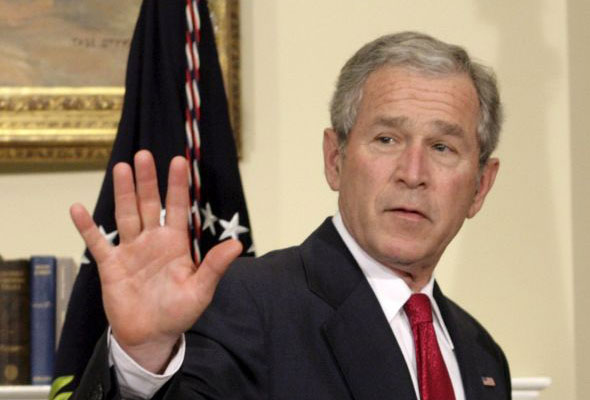Life after Bush
New Statesman |
By PARAG KHANNA
Sadly, the world after Bush will still be Bush's world - plagued by the Iraq War, faltered alliances, terrorism unabated, and anti-American violence. Many of these phenomena began to crest in the 1990s, but over eight years Bush has done little but inflame them - the proverbial arsonist in the firehouse. The next U.S. president will not be able to hit the ground running, for he (or she) must first dampen the fires. The next president - whether Hillary, Obama, or Huckabee - might be granted some global goodwill, but there will be no lengthy suspended animation. Geopolitically, the world is already moving on: the European Union is expanding and building a post-NATO, Euro-centric order stretching from Ireland to Azerbaijan, connecting pipelines to North Africa, signing free trade with the Gulf oil sheikhdoms, and dealing on equal terms with the Chinese.
China, too, is a post-American superpower, constructing a "Greater Chinese Co-Prosperity Sphere" across all of East Asia and even Central Asia through the Shanghai Cooperation Organization (SCO). All the countries in the middle are building foreign exchange reserves, establishing sovereign wealth funds, and either buffering themselves against the sliding U.S. dollar or buying up America because of it. In this context, the task of the next American leader is not to pretend that America can or will ever again run the world, or even singularly lead it. America is a world unto itself, and the president's first task is to deal with the home front: immigration, healthcare, education, infrastructure - all areas lacking in political consensus, budgetary funding, and competent leadership. Initially, in terms of foreign policy, there are messes to clean up, meaning exiting from Iraq while attempting to negotiate a continued troop presence (the Pentagon will demand it), shoring up Afghanistan, and keeping Pakistan stable. Then there are relations to normalize: with Latin America and Europe most of all. If the above go well, and they may not no matter who is president, he or she could consider "bold, new, fresh" initiatives which are always over-promised and under-delivered. But many of these really can wait - the world has had enough of America's bright ideas for a while. So the aim is modesty in all things, and calibrated strategies for each issue and region, not a blanket global doctrine. There are countries where America's ability to support even progressive change is slipping: Egypt, Saudi Arabia, Iran, Uzbekistan, Pakistan, and others. These are the first bilateral strategic priorities - but they are also tests for strengthening cooperation with the key geopolitical leaders of Europe and China. Iran's combustible mix of oil, terrorism, nuclear weapons, technology and investment needs sorting out, and only European sticks, American carrots, and China either getting off the fence or out of the way can untangle it. Maintaining stability in the Saudi kingdom and the quasi-monarchic Egypt under the frail Hosni Mubarak also requires greater European involvement rather than more American meddling. Can the transatlantic partners create a meaningful division of labour to create jobs and also encourage political liberalization in the Middle East? Then there is the geopolitical personality management of entrenched leaders like Islam Karimov and Musharraf in Pakistan, who need serious help to change course before their countries become even graver threats to regional security. If America can't find ways to get Europe and China on the same page on the above, its own regime change won't mean much. America will still be America on January 20, 2009 - it will still be the country that bungled Iraq and can barely manage Hugo Chavez. It will not suddenly become a nimble multi-tasking soft superpower. The next US president must rebuild bridges with key countries around the world not because it will improve America's image, but because it has to in order to remain relevant as a global leader.
